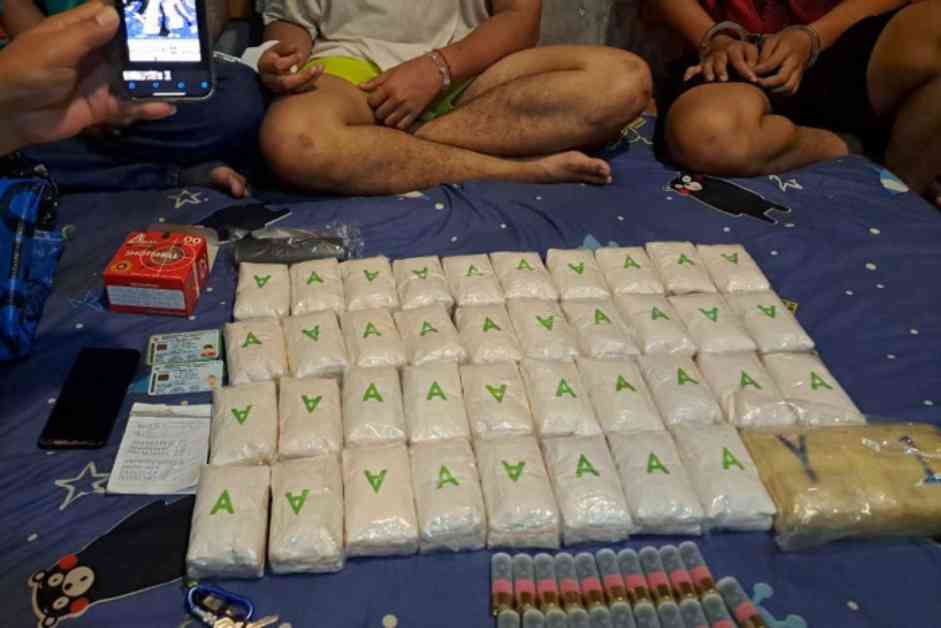Growing Concern: Rise in Arrests of Young Drug Dealers in Northeast Thailand
In a troubling trend, authorities in Northeast Thailand have seen a rise in the arrests of young individuals involved in drug dealing activities. The recent arrests of two minors in Buri Ram province have raised concerns about the increasing involvement of young people in the illicit drug trade.
The arrests took place in tambon Isan of the province’s Muang district, where a 16- and 17-year-old were apprehended on suspicion of selling drugs. According to authorities, the minors confessed to delivering ya ba pills on behalf of an older dealer who had fled to Laos to evade drug charges. The investigation led the authorities to a hidden stash containing a staggering 122,500 yaba pills.
Following this incident, five vocational school students were also arrested in a separate drug bust in the same province. The students, aged between 19 and 20, were allegedly part of a drug dealing operation and were found in possession of approximately 82,000 meth pills. It was revealed that they were acting under the instructions of an older individual who had escaped to Laos.
The connection between the two cases suggests a larger drug network operating in the region, involving both young individuals and older, more experienced dealers. The increase in arrests of young drug dealers is a cause for concern, as it indicates a growing trend of youth involvement in illicit drug activities.
Root Causes of Youth Involvement in Drug Dealing
The rise in arrests of young drug dealers in Northeast Thailand points to underlying issues that may be driving youth involvement in drug trafficking. One possible factor is the lack of opportunities for young people in the region, leading them to turn to illicit activities as a means of making a living. Economic hardships, limited access to education and employment opportunities, and socio-economic inequalities can push vulnerable youth towards the drug trade.
Moreover, the influence of older, more experienced drug dealers on impressionable young individuals cannot be overlooked. These older dealers often prey on young people, exploiting their naivety and vulnerability to recruit them into their illegal operations. The allure of quick money and a glamorous lifestyle portrayed by drug traffickers can be enticing for young individuals who may lack guidance and positive role models in their lives.
Impact on Communities and Society
The increasing involvement of young people in drug dealing has far-reaching consequences for communities and society at large. Drug trafficking not only fuels addiction and substance abuse but also contributes to a range of social problems, including crime, violence, and instability. The presence of drug dealers in neighborhoods can disrupt the social fabric, instill fear among residents, and lead to a deterioration of community safety.
Furthermore, the exploitation of young individuals by drug syndicates perpetuates a cycle of criminality and victimization. Youth who are lured into the drug trade at a young age may find it difficult to break free from the cycle of addiction and criminal activity, leading to long-term negative outcomes for both the individuals involved and the communities they reside in.
The arrest of young drug dealers highlights the urgent need for comprehensive strategies to address the root causes of youth involvement in drug trafficking and to provide support and alternatives for at-risk youth. Prevention efforts, including education, vocational training, mentorship programs, and community outreach initiatives, are crucial in steering young people away from the dangers of the drug trade.
Government Response and Law Enforcement Efforts
In response to the growing concern over the rise in arrests of young drug dealers, government authorities in Northeast Thailand have ramped up their efforts to combat drug trafficking in the region. Collaborative initiatives involving the police, military, and other law enforcement agencies have been launched to target drug syndicates and dismantle their operations.
The recent arrests of young individuals involved in drug dealing reflect the effectiveness of these coordinated efforts in apprehending offenders and seizing illicit drugs. By working together and sharing intelligence, law enforcement agencies have been able to disrupt the activities of drug networks and hold perpetrators accountable for their crimes.
However, the fight against drug trafficking requires a multi-faceted approach that goes beyond just enforcement measures. Addressing the root causes of youth involvement in the drug trade, providing support and rehabilitation services for affected individuals, and engaging with communities to prevent drug-related crimes are essential components of a comprehensive anti-drug strategy.
In conclusion, the rise in arrests of young drug dealers in Northeast Thailand underscores the need for proactive measures to address the underlying factors driving youth involvement in drug trafficking. By addressing socio-economic disparities, offering opportunities for education and employment, and providing support and guidance to at-risk youth, authorities can help prevent the exploitation of young individuals by drug syndicates and protect communities from the harmful effects of drug trafficking.




















